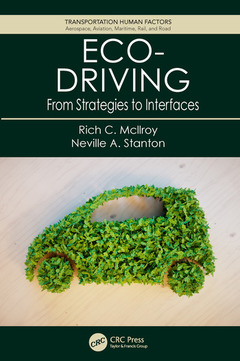Eco-Driving From Strategies to Interfaces Transportation Human Factors Series
Auteurs : Mcllroy Rich C., Stanton Neville A.

Eco-driving has the potential to save fuel and reduce emissions without having to make any changes to vehicles or road infrastructure. This book provides an in-depth understanding of the contemporary issues in the human factors aspects of eco-driving strategies and interfaces and the effects on driver behaviour. A review of the literature concerning design, behaviour, and energy use led to an exploration of Ecological Interface Design, and the Skills, Rules, and Knowledge (SRK) taxonomy of human behaviour, particularly with regard to haptic information presented through the accelerator pedal. This book explains that eco-driving can be performed by anyone in control of a vehicle.
Introduction. Design, Behaviour, and Energy Use. Driving and the Environment: An Exploratory Survey Study. Verbal Reports: An Exploratory On-Road Study. Two Decades of Ecological Interface Design, and the Importance of the SRK Taxonomy. A Decision Ladder Analysis of Eco-Driving: The First Step Towards Fuel-Efficient Driving Behaviour. In-Vehicle Information System Design. Ecological Driving with Multi-Sensory Information. When to Give Those Good Vibrations. Conclusions and Future Work. References. Appendices.
Dr. Rich C. McIlroy received the B.Sc. (Hons) degree in psychology and the M.Sc. degree in research methods in psychology from the University of Southampton, UK, in 2008 and 2009 respectively. He was recently awarded his Engineering Doctorate by the same university, having been based in the Transportation Research Group, Faculty of Engineering and the Environment. He has published over 16 articles, across a variety of topics, including eco-driving and the effect of in-vehicle information on driving behaviour and fuel use, the effect of multi-sensory information on responding, the general utility of Ecological Interface Design, the link between expertise development and verbal reporting, the use of non-intrusive verbal reporting for information acquisition, and the ability of Cognitive Work Analysis, and its various components, to support decision making and system design in a variety of domains, from rail transport to system requirements specification.
Professor Neville A. Stanton, PhD, DSc, is a chartered psychologist, chartered ergonomist and chartered engineer. He holds the Chair in Human Factors Engineering in the Faculty of Engineering and the Environment at the University of Southampton in the United Kingdom. He has degrees in Occupational Psychology, Applied Psychology and Human Factors Engineering and has worked at the Universities of Aston, Brunel, Cornell and MIT. His research interests include modelling, predicting, analysing and evaluating human performance in systems as well as designing the interfaces and interaction between humans and technology. Professor Stanton has worked on design of automobiles, aircraft, ships and control rooms over the past 30 years, on a variety of automation projects. He has published 35 books and over 280 journal papers on Ergonomics and Human Factors. In 1998, he was presented with the Institution of Electrical Engineers Divisional Premium Award for research into System Safety. Th
Date de parution : 11-2017
15.6x23.4 cm
Thèmes d’Eco-Driving :
Mots-clés :
Eco-driving Behaviours; Vehicles; Work Domain Analysis; Vibrotactile Stimuli; Accelerator Pedal; Multi-sensory Information; Fuel Efficient Driving; Cognition; Decision Ladder; Driving Simulation; In-vehicle Information System; Hatpic Feedback; Electric Vehicles; Rich C; McIlroy; EID; Neville A; Stanton; Low Carbon Vehicles; Eco-driving Support; SRK Taxonomy; Abstraction Decomposition Space; Lead Time Condition; Significant Pairwise Comparisons; Van Der Voort; Haptic Information; Verbal Protocol Analysis; Decision Ladder Analyses; In-vehicle Information; Eco-driving Information; Van Der Laan; Wilcoxon Signed Rank Test; ConTA; Contextual Activity Template; Centre Line Crossings



